Hospitality Industry Decision Making Models
VerifiedAdded on 2021/02/22
|15
|5357
|97
AI Summary
This assignment focuses on the hospitality industry, specifically examining the influence of cognitive or behavioural models on decision-making stages. The discussion encompasses various aspects, including marketers' choices, consumers' behaviour, and leadership effects in the industry. Relevant research papers and studies are referenced to provide a comprehensive understanding of these concepts.
Contribute Materials
Your contribution can guide someone’s learning journey. Share your
documents today.
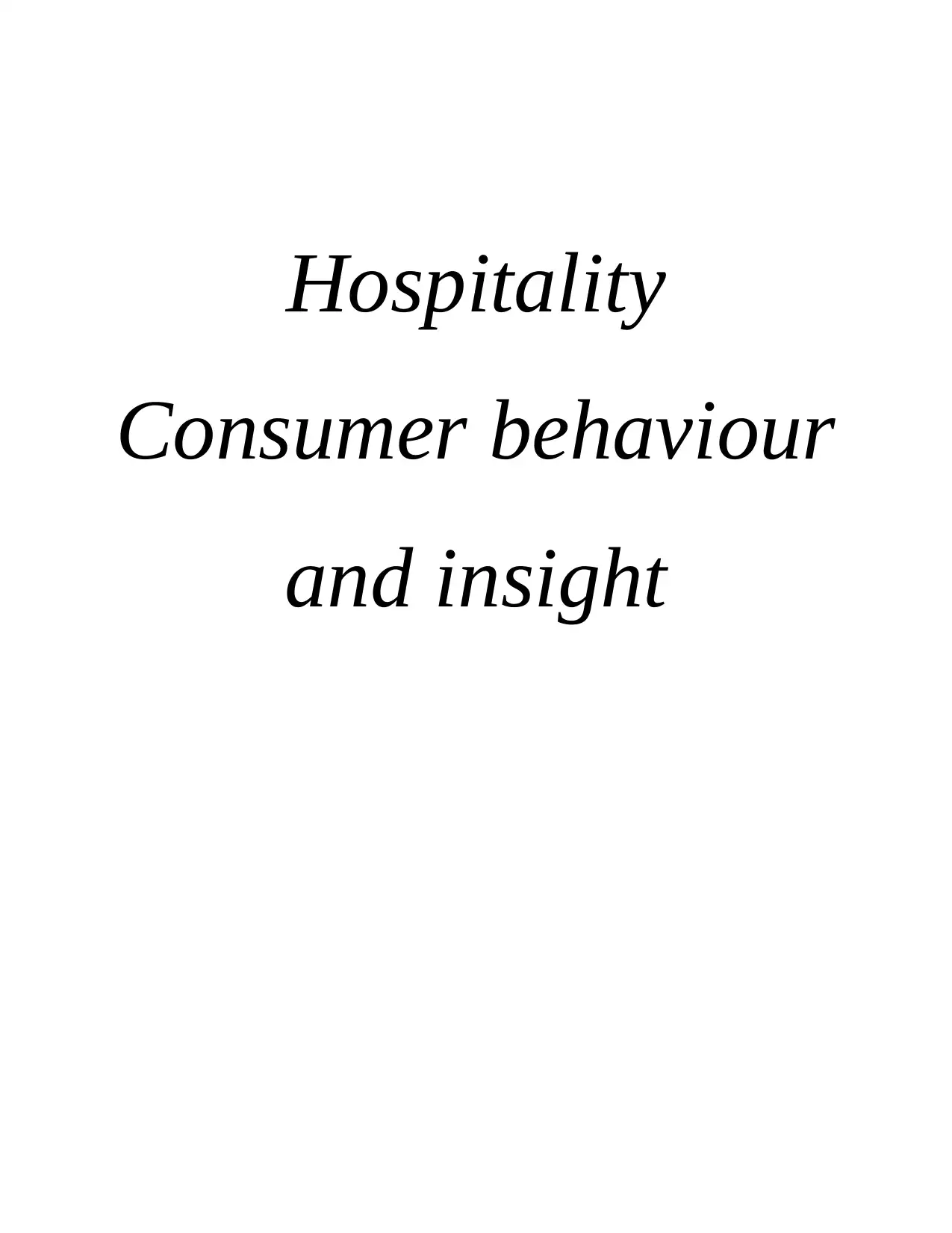
Hospitality
Consumer behaviour
and insight
Consumer behaviour
and insight
Secure Best Marks with AI Grader
Need help grading? Try our AI Grader for instant feedback on your assignments.
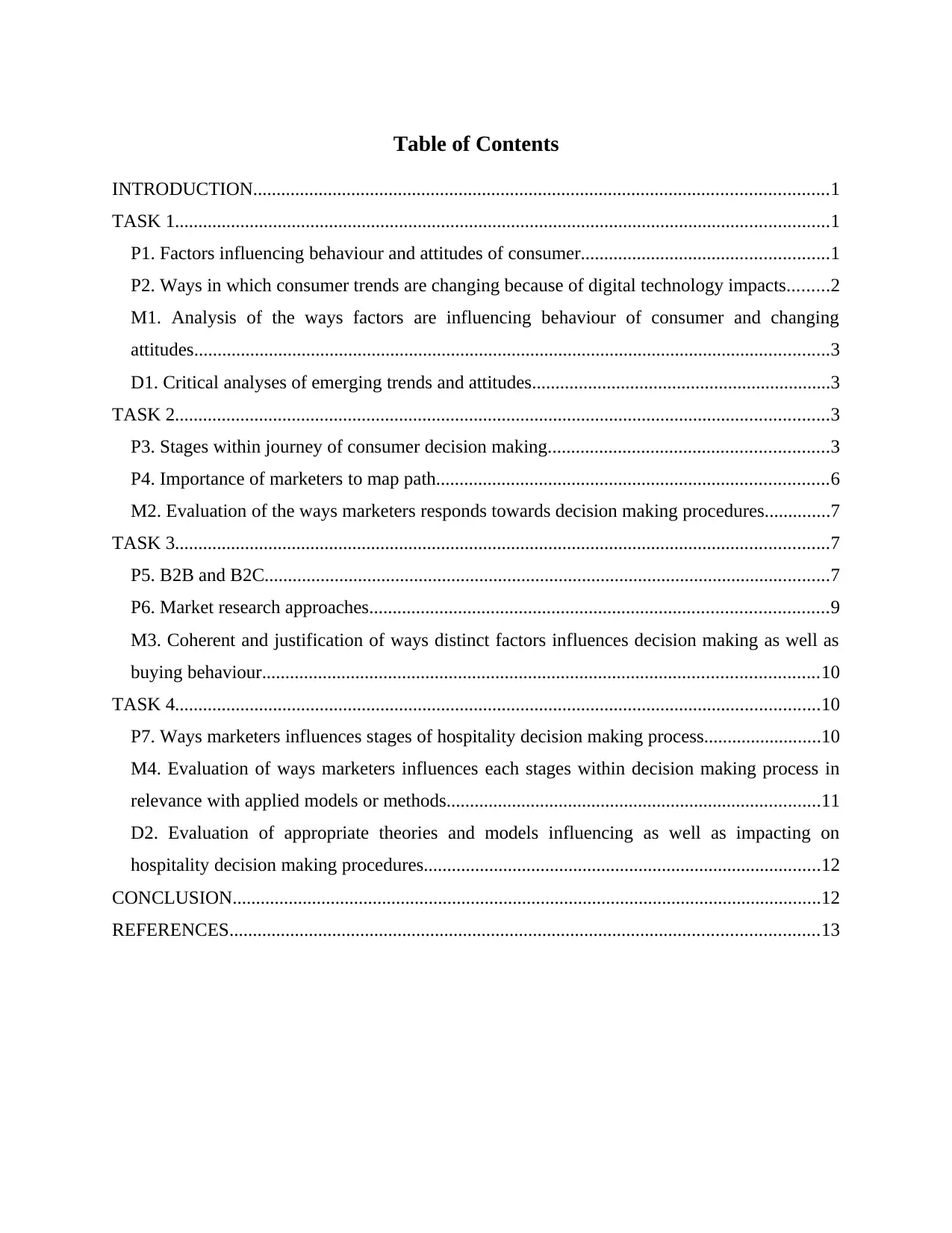
Table of Contents
INTRODUCTION...........................................................................................................................1
TASK 1............................................................................................................................................1
P1. Factors influencing behaviour and attitudes of consumer.....................................................1
P2. Ways in which consumer trends are changing because of digital technology impacts.........2
M1. Analysis of the ways factors are influencing behaviour of consumer and changing
attitudes........................................................................................................................................3
D1. Critical analyses of emerging trends and attitudes................................................................3
TASK 2............................................................................................................................................3
P3. Stages within journey of consumer decision making............................................................3
P4. Importance of marketers to map path....................................................................................6
M2. Evaluation of the ways marketers responds towards decision making procedures..............7
TASK 3............................................................................................................................................7
P5. B2B and B2C.........................................................................................................................7
P6. Market research approaches..................................................................................................9
M3. Coherent and justification of ways distinct factors influences decision making as well as
buying behaviour.......................................................................................................................10
TASK 4..........................................................................................................................................10
P7. Ways marketers influences stages of hospitality decision making process.........................10
M4. Evaluation of ways marketers influences each stages within decision making process in
relevance with applied models or methods................................................................................11
D2. Evaluation of appropriate theories and models influencing as well as impacting on
hospitality decision making procedures.....................................................................................12
CONCLUSION..............................................................................................................................12
REFERENCES..............................................................................................................................13
INTRODUCTION...........................................................................................................................1
TASK 1............................................................................................................................................1
P1. Factors influencing behaviour and attitudes of consumer.....................................................1
P2. Ways in which consumer trends are changing because of digital technology impacts.........2
M1. Analysis of the ways factors are influencing behaviour of consumer and changing
attitudes........................................................................................................................................3
D1. Critical analyses of emerging trends and attitudes................................................................3
TASK 2............................................................................................................................................3
P3. Stages within journey of consumer decision making............................................................3
P4. Importance of marketers to map path....................................................................................6
M2. Evaluation of the ways marketers responds towards decision making procedures..............7
TASK 3............................................................................................................................................7
P5. B2B and B2C.........................................................................................................................7
P6. Market research approaches..................................................................................................9
M3. Coherent and justification of ways distinct factors influences decision making as well as
buying behaviour.......................................................................................................................10
TASK 4..........................................................................................................................................10
P7. Ways marketers influences stages of hospitality decision making process.........................10
M4. Evaluation of ways marketers influences each stages within decision making process in
relevance with applied models or methods................................................................................11
D2. Evaluation of appropriate theories and models influencing as well as impacting on
hospitality decision making procedures.....................................................................................12
CONCLUSION..............................................................................................................................12
REFERENCES..............................................................................................................................13
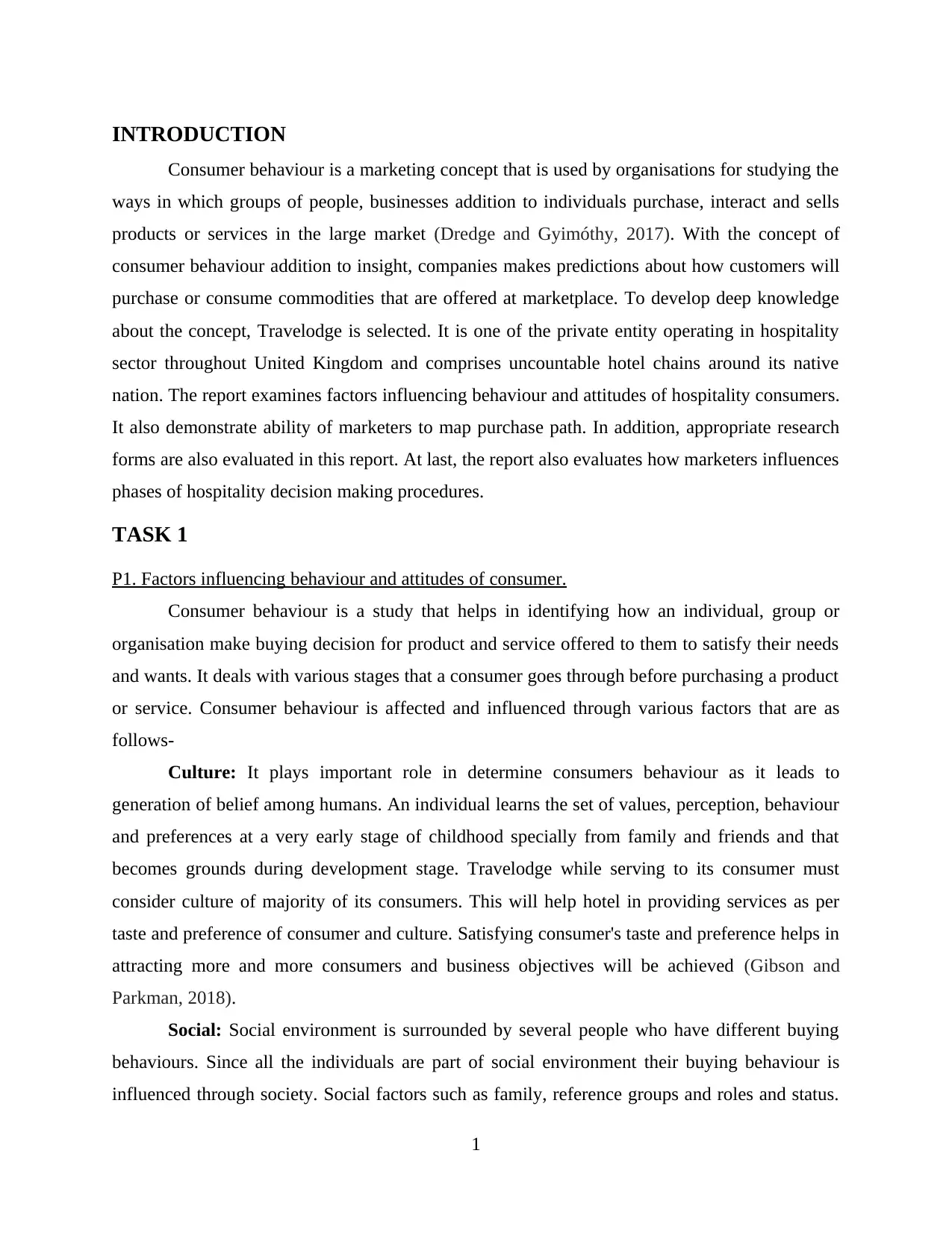
INTRODUCTION
Consumer behaviour is a marketing concept that is used by organisations for studying the
ways in which groups of people, businesses addition to individuals purchase, interact and sells
products or services in the large market (Dredge and Gyimóthy, 2017). With the concept of
consumer behaviour addition to insight, companies makes predictions about how customers will
purchase or consume commodities that are offered at marketplace. To develop deep knowledge
about the concept, Travelodge is selected. It is one of the private entity operating in hospitality
sector throughout United Kingdom and comprises uncountable hotel chains around its native
nation. The report examines factors influencing behaviour and attitudes of hospitality consumers.
It also demonstrate ability of marketers to map purchase path. In addition, appropriate research
forms are also evaluated in this report. At last, the report also evaluates how marketers influences
phases of hospitality decision making procedures.
TASK 1
P1. Factors influencing behaviour and attitudes of consumer.
Consumer behaviour is a study that helps in identifying how an individual, group or
organisation make buying decision for product and service offered to them to satisfy their needs
and wants. It deals with various stages that a consumer goes through before purchasing a product
or service. Consumer behaviour is affected and influenced through various factors that are as
follows-
Culture: It plays important role in determine consumers behaviour as it leads to
generation of belief among humans. An individual learns the set of values, perception, behaviour
and preferences at a very early stage of childhood specially from family and friends and that
becomes grounds during development stage. Travelodge while serving to its consumer must
consider culture of majority of its consumers. This will help hotel in providing services as per
taste and preference of consumer and culture. Satisfying consumer's taste and preference helps in
attracting more and more consumers and business objectives will be achieved (Gibson and
Parkman, 2018).
Social: Social environment is surrounded by several people who have different buying
behaviours. Since all the individuals are part of social environment their buying behaviour is
influenced through society. Social factors such as family, reference groups and roles and status.
1
Consumer behaviour is a marketing concept that is used by organisations for studying the
ways in which groups of people, businesses addition to individuals purchase, interact and sells
products or services in the large market (Dredge and Gyimóthy, 2017). With the concept of
consumer behaviour addition to insight, companies makes predictions about how customers will
purchase or consume commodities that are offered at marketplace. To develop deep knowledge
about the concept, Travelodge is selected. It is one of the private entity operating in hospitality
sector throughout United Kingdom and comprises uncountable hotel chains around its native
nation. The report examines factors influencing behaviour and attitudes of hospitality consumers.
It also demonstrate ability of marketers to map purchase path. In addition, appropriate research
forms are also evaluated in this report. At last, the report also evaluates how marketers influences
phases of hospitality decision making procedures.
TASK 1
P1. Factors influencing behaviour and attitudes of consumer.
Consumer behaviour is a study that helps in identifying how an individual, group or
organisation make buying decision for product and service offered to them to satisfy their needs
and wants. It deals with various stages that a consumer goes through before purchasing a product
or service. Consumer behaviour is affected and influenced through various factors that are as
follows-
Culture: It plays important role in determine consumers behaviour as it leads to
generation of belief among humans. An individual learns the set of values, perception, behaviour
and preferences at a very early stage of childhood specially from family and friends and that
becomes grounds during development stage. Travelodge while serving to its consumer must
consider culture of majority of its consumers. This will help hotel in providing services as per
taste and preference of consumer and culture. Satisfying consumer's taste and preference helps in
attracting more and more consumers and business objectives will be achieved (Gibson and
Parkman, 2018).
Social: Social environment is surrounded by several people who have different buying
behaviours. Since all the individuals are part of social environment their buying behaviour is
influenced through society. Social factors such as family, reference groups and roles and status.
1
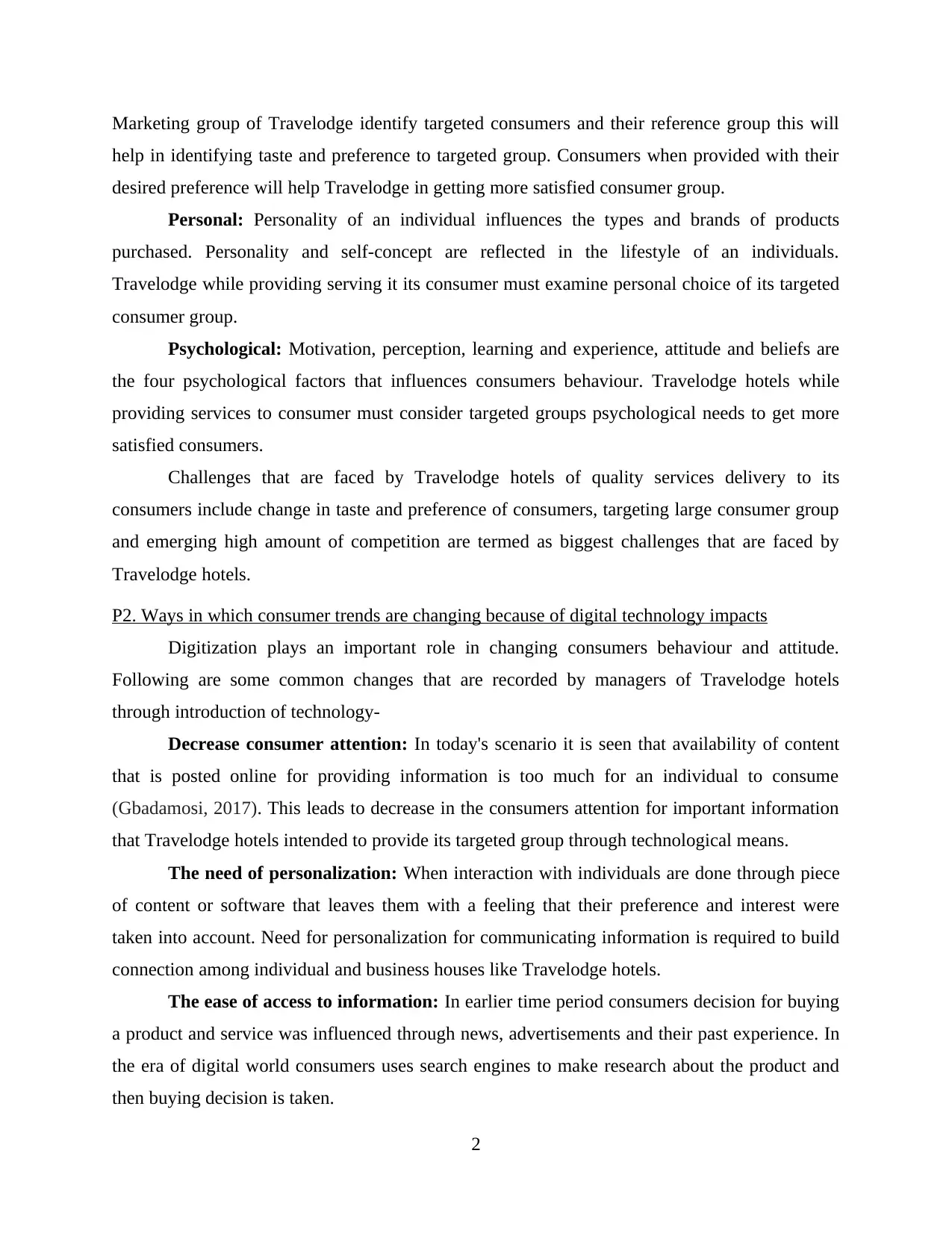
Marketing group of Travelodge identify targeted consumers and their reference group this will
help in identifying taste and preference to targeted group. Consumers when provided with their
desired preference will help Travelodge in getting more satisfied consumer group.
Personal: Personality of an individual influences the types and brands of products
purchased. Personality and self-concept are reflected in the lifestyle of an individuals.
Travelodge while providing serving it its consumer must examine personal choice of its targeted
consumer group.
Psychological: Motivation, perception, learning and experience, attitude and beliefs are
the four psychological factors that influences consumers behaviour. Travelodge hotels while
providing services to consumer must consider targeted groups psychological needs to get more
satisfied consumers.
Challenges that are faced by Travelodge hotels of quality services delivery to its
consumers include change in taste and preference of consumers, targeting large consumer group
and emerging high amount of competition are termed as biggest challenges that are faced by
Travelodge hotels.
P2. Ways in which consumer trends are changing because of digital technology impacts
Digitization plays an important role in changing consumers behaviour and attitude.
Following are some common changes that are recorded by managers of Travelodge hotels
through introduction of technology-
Decrease consumer attention: In today's scenario it is seen that availability of content
that is posted online for providing information is too much for an individual to consume
(Gbadamosi, 2017). This leads to decrease in the consumers attention for important information
that Travelodge hotels intended to provide its targeted group through technological means.
The need of personalization: When interaction with individuals are done through piece
of content or software that leaves them with a feeling that their preference and interest were
taken into account. Need for personalization for communicating information is required to build
connection among individual and business houses like Travelodge hotels.
The ease of access to information: In earlier time period consumers decision for buying
a product and service was influenced through news, advertisements and their past experience. In
the era of digital world consumers uses search engines to make research about the product and
then buying decision is taken.
2
help in identifying taste and preference to targeted group. Consumers when provided with their
desired preference will help Travelodge in getting more satisfied consumer group.
Personal: Personality of an individual influences the types and brands of products
purchased. Personality and self-concept are reflected in the lifestyle of an individuals.
Travelodge while providing serving it its consumer must examine personal choice of its targeted
consumer group.
Psychological: Motivation, perception, learning and experience, attitude and beliefs are
the four psychological factors that influences consumers behaviour. Travelodge hotels while
providing services to consumer must consider targeted groups psychological needs to get more
satisfied consumers.
Challenges that are faced by Travelodge hotels of quality services delivery to its
consumers include change in taste and preference of consumers, targeting large consumer group
and emerging high amount of competition are termed as biggest challenges that are faced by
Travelodge hotels.
P2. Ways in which consumer trends are changing because of digital technology impacts
Digitization plays an important role in changing consumers behaviour and attitude.
Following are some common changes that are recorded by managers of Travelodge hotels
through introduction of technology-
Decrease consumer attention: In today's scenario it is seen that availability of content
that is posted online for providing information is too much for an individual to consume
(Gbadamosi, 2017). This leads to decrease in the consumers attention for important information
that Travelodge hotels intended to provide its targeted group through technological means.
The need of personalization: When interaction with individuals are done through piece
of content or software that leaves them with a feeling that their preference and interest were
taken into account. Need for personalization for communicating information is required to build
connection among individual and business houses like Travelodge hotels.
The ease of access to information: In earlier time period consumers decision for buying
a product and service was influenced through news, advertisements and their past experience. In
the era of digital world consumers uses search engines to make research about the product and
then buying decision is taken.
2
Secure Best Marks with AI Grader
Need help grading? Try our AI Grader for instant feedback on your assignments.
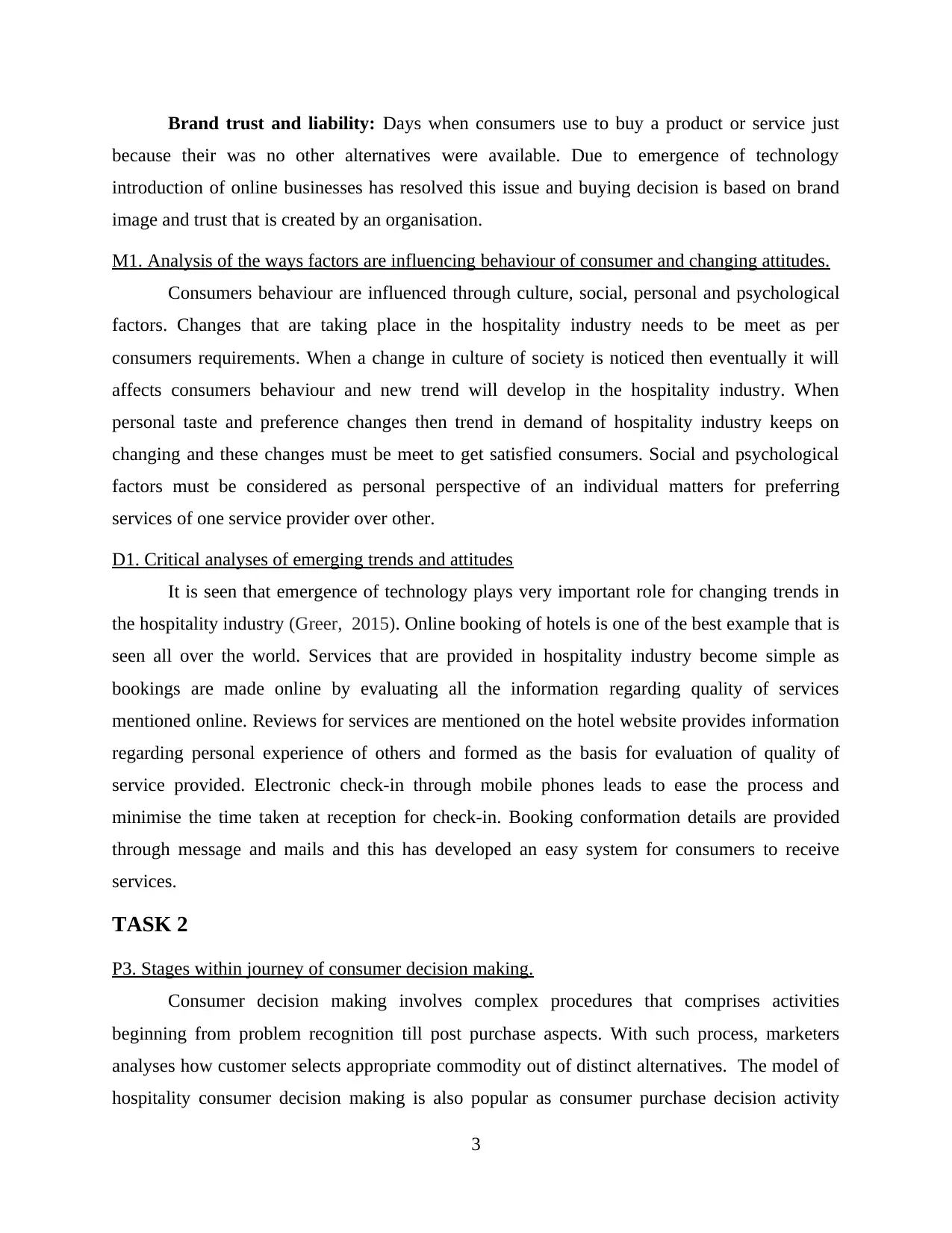
Brand trust and liability: Days when consumers use to buy a product or service just
because their was no other alternatives were available. Due to emergence of technology
introduction of online businesses has resolved this issue and buying decision is based on brand
image and trust that is created by an organisation.
M1. Analysis of the ways factors are influencing behaviour of consumer and changing attitudes.
Consumers behaviour are influenced through culture, social, personal and psychological
factors. Changes that are taking place in the hospitality industry needs to be meet as per
consumers requirements. When a change in culture of society is noticed then eventually it will
affects consumers behaviour and new trend will develop in the hospitality industry. When
personal taste and preference changes then trend in demand of hospitality industry keeps on
changing and these changes must be meet to get satisfied consumers. Social and psychological
factors must be considered as personal perspective of an individual matters for preferring
services of one service provider over other.
D1. Critical analyses of emerging trends and attitudes
It is seen that emergence of technology plays very important role for changing trends in
the hospitality industry (Greer, 2015). Online booking of hotels is one of the best example that is
seen all over the world. Services that are provided in hospitality industry become simple as
bookings are made online by evaluating all the information regarding quality of services
mentioned online. Reviews for services are mentioned on the hotel website provides information
regarding personal experience of others and formed as the basis for evaluation of quality of
service provided. Electronic check-in through mobile phones leads to ease the process and
minimise the time taken at reception for check-in. Booking conformation details are provided
through message and mails and this has developed an easy system for consumers to receive
services.
TASK 2
P3. Stages within journey of consumer decision making.
Consumer decision making involves complex procedures that comprises activities
beginning from problem recognition till post purchase aspects. With such process, marketers
analyses how customer selects appropriate commodity out of distinct alternatives. The model of
hospitality consumer decision making is also popular as consumer purchase decision activity
3
because their was no other alternatives were available. Due to emergence of technology
introduction of online businesses has resolved this issue and buying decision is based on brand
image and trust that is created by an organisation.
M1. Analysis of the ways factors are influencing behaviour of consumer and changing attitudes.
Consumers behaviour are influenced through culture, social, personal and psychological
factors. Changes that are taking place in the hospitality industry needs to be meet as per
consumers requirements. When a change in culture of society is noticed then eventually it will
affects consumers behaviour and new trend will develop in the hospitality industry. When
personal taste and preference changes then trend in demand of hospitality industry keeps on
changing and these changes must be meet to get satisfied consumers. Social and psychological
factors must be considered as personal perspective of an individual matters for preferring
services of one service provider over other.
D1. Critical analyses of emerging trends and attitudes
It is seen that emergence of technology plays very important role for changing trends in
the hospitality industry (Greer, 2015). Online booking of hotels is one of the best example that is
seen all over the world. Services that are provided in hospitality industry become simple as
bookings are made online by evaluating all the information regarding quality of services
mentioned online. Reviews for services are mentioned on the hotel website provides information
regarding personal experience of others and formed as the basis for evaluation of quality of
service provided. Electronic check-in through mobile phones leads to ease the process and
minimise the time taken at reception for check-in. Booking conformation details are provided
through message and mails and this has developed an easy system for consumers to receive
services.
TASK 2
P3. Stages within journey of consumer decision making.
Consumer decision making involves complex procedures that comprises activities
beginning from problem recognition till post purchase aspects. With such process, marketers
analyses how customer selects appropriate commodity out of distinct alternatives. The model of
hospitality consumer decision making is also popular as consumer purchase decision activity
3
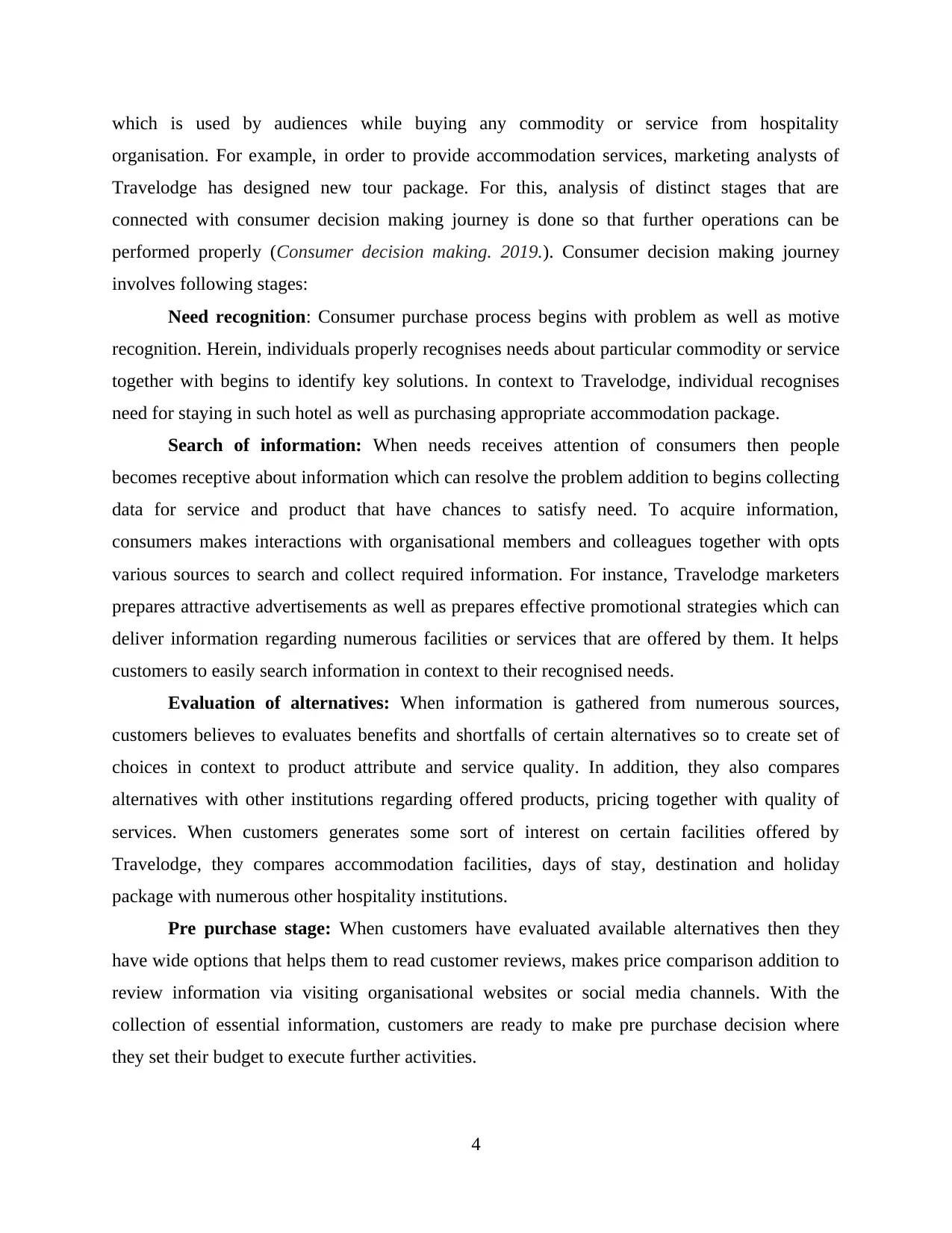
which is used by audiences while buying any commodity or service from hospitality
organisation. For example, in order to provide accommodation services, marketing analysts of
Travelodge has designed new tour package. For this, analysis of distinct stages that are
connected with consumer decision making journey is done so that further operations can be
performed properly (Consumer decision making. 2019.). Consumer decision making journey
involves following stages:
Need recognition: Consumer purchase process begins with problem as well as motive
recognition. Herein, individuals properly recognises needs about particular commodity or service
together with begins to identify key solutions. In context to Travelodge, individual recognises
need for staying in such hotel as well as purchasing appropriate accommodation package.
Search of information: When needs receives attention of consumers then people
becomes receptive about information which can resolve the problem addition to begins collecting
data for service and product that have chances to satisfy need. To acquire information,
consumers makes interactions with organisational members and colleagues together with opts
various sources to search and collect required information. For instance, Travelodge marketers
prepares attractive advertisements as well as prepares effective promotional strategies which can
deliver information regarding numerous facilities or services that are offered by them. It helps
customers to easily search information in context to their recognised needs.
Evaluation of alternatives: When information is gathered from numerous sources,
customers believes to evaluates benefits and shortfalls of certain alternatives so to create set of
choices in context to product attribute and service quality. In addition, they also compares
alternatives with other institutions regarding offered products, pricing together with quality of
services. When customers generates some sort of interest on certain facilities offered by
Travelodge, they compares accommodation facilities, days of stay, destination and holiday
package with numerous other hospitality institutions.
Pre purchase stage: When customers have evaluated available alternatives then they
have wide options that helps them to read customer reviews, makes price comparison addition to
review information via visiting organisational websites or social media channels. With the
collection of essential information, customers are ready to make pre purchase decision where
they set their budget to execute further activities.
4
organisation. For example, in order to provide accommodation services, marketing analysts of
Travelodge has designed new tour package. For this, analysis of distinct stages that are
connected with consumer decision making journey is done so that further operations can be
performed properly (Consumer decision making. 2019.). Consumer decision making journey
involves following stages:
Need recognition: Consumer purchase process begins with problem as well as motive
recognition. Herein, individuals properly recognises needs about particular commodity or service
together with begins to identify key solutions. In context to Travelodge, individual recognises
need for staying in such hotel as well as purchasing appropriate accommodation package.
Search of information: When needs receives attention of consumers then people
becomes receptive about information which can resolve the problem addition to begins collecting
data for service and product that have chances to satisfy need. To acquire information,
consumers makes interactions with organisational members and colleagues together with opts
various sources to search and collect required information. For instance, Travelodge marketers
prepares attractive advertisements as well as prepares effective promotional strategies which can
deliver information regarding numerous facilities or services that are offered by them. It helps
customers to easily search information in context to their recognised needs.
Evaluation of alternatives: When information is gathered from numerous sources,
customers believes to evaluates benefits and shortfalls of certain alternatives so to create set of
choices in context to product attribute and service quality. In addition, they also compares
alternatives with other institutions regarding offered products, pricing together with quality of
services. When customers generates some sort of interest on certain facilities offered by
Travelodge, they compares accommodation facilities, days of stay, destination and holiday
package with numerous other hospitality institutions.
Pre purchase stage: When customers have evaluated available alternatives then they
have wide options that helps them to read customer reviews, makes price comparison addition to
review information via visiting organisational websites or social media channels. With the
collection of essential information, customers are ready to make pre purchase decision where
they set their budget to execute further activities.
4
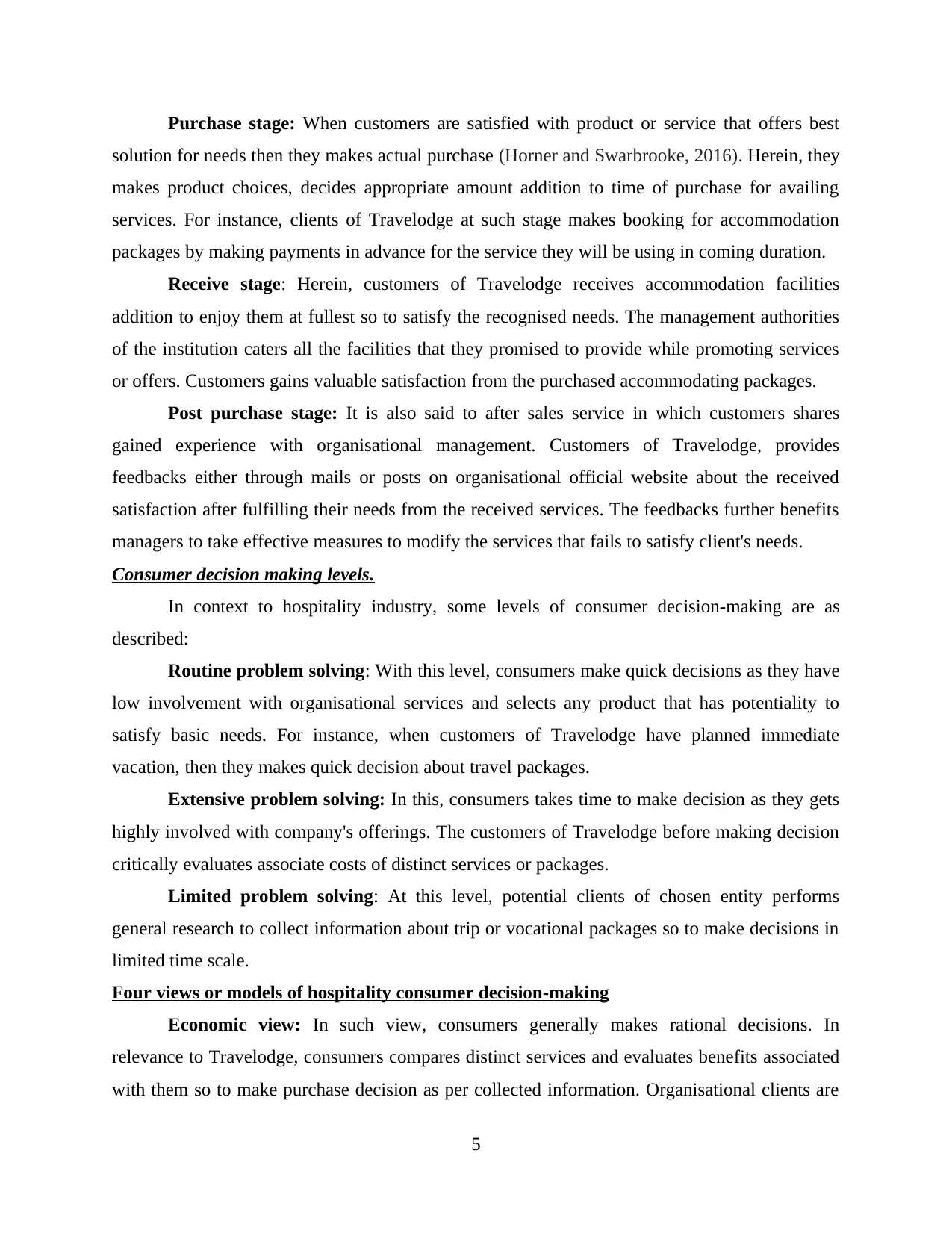
Purchase stage: When customers are satisfied with product or service that offers best
solution for needs then they makes actual purchase (Horner and Swarbrooke, 2016). Herein, they
makes product choices, decides appropriate amount addition to time of purchase for availing
services. For instance, clients of Travelodge at such stage makes booking for accommodation
packages by making payments in advance for the service they will be using in coming duration.
Receive stage: Herein, customers of Travelodge receives accommodation facilities
addition to enjoy them at fullest so to satisfy the recognised needs. The management authorities
of the institution caters all the facilities that they promised to provide while promoting services
or offers. Customers gains valuable satisfaction from the purchased accommodating packages.
Post purchase stage: It is also said to after sales service in which customers shares
gained experience with organisational management. Customers of Travelodge, provides
feedbacks either through mails or posts on organisational official website about the received
satisfaction after fulfilling their needs from the received services. The feedbacks further benefits
managers to take effective measures to modify the services that fails to satisfy client's needs.
Consumer decision making levels.
In context to hospitality industry, some levels of consumer decision-making are as
described:
Routine problem solving: With this level, consumers make quick decisions as they have
low involvement with organisational services and selects any product that has potentiality to
satisfy basic needs. For instance, when customers of Travelodge have planned immediate
vacation, then they makes quick decision about travel packages.
Extensive problem solving: In this, consumers takes time to make decision as they gets
highly involved with company's offerings. The customers of Travelodge before making decision
critically evaluates associate costs of distinct services or packages.
Limited problem solving: At this level, potential clients of chosen entity performs
general research to collect information about trip or vocational packages so to make decisions in
limited time scale.
Four views or models of hospitality consumer decision-making
Economic view: In such view, consumers generally makes rational decisions. In
relevance to Travelodge, consumers compares distinct services and evaluates benefits associated
with them so to make purchase decision as per collected information. Organisational clients are
5
solution for needs then they makes actual purchase (Horner and Swarbrooke, 2016). Herein, they
makes product choices, decides appropriate amount addition to time of purchase for availing
services. For instance, clients of Travelodge at such stage makes booking for accommodation
packages by making payments in advance for the service they will be using in coming duration.
Receive stage: Herein, customers of Travelodge receives accommodation facilities
addition to enjoy them at fullest so to satisfy the recognised needs. The management authorities
of the institution caters all the facilities that they promised to provide while promoting services
or offers. Customers gains valuable satisfaction from the purchased accommodating packages.
Post purchase stage: It is also said to after sales service in which customers shares
gained experience with organisational management. Customers of Travelodge, provides
feedbacks either through mails or posts on organisational official website about the received
satisfaction after fulfilling their needs from the received services. The feedbacks further benefits
managers to take effective measures to modify the services that fails to satisfy client's needs.
Consumer decision making levels.
In context to hospitality industry, some levels of consumer decision-making are as
described:
Routine problem solving: With this level, consumers make quick decisions as they have
low involvement with organisational services and selects any product that has potentiality to
satisfy basic needs. For instance, when customers of Travelodge have planned immediate
vacation, then they makes quick decision about travel packages.
Extensive problem solving: In this, consumers takes time to make decision as they gets
highly involved with company's offerings. The customers of Travelodge before making decision
critically evaluates associate costs of distinct services or packages.
Limited problem solving: At this level, potential clients of chosen entity performs
general research to collect information about trip or vocational packages so to make decisions in
limited time scale.
Four views or models of hospitality consumer decision-making
Economic view: In such view, consumers generally makes rational decisions. In
relevance to Travelodge, consumers compares distinct services and evaluates benefits associated
with them so to make purchase decision as per collected information. Organisational clients are
5
Paraphrase This Document
Need a fresh take? Get an instant paraphrase of this document with our AI Paraphraser
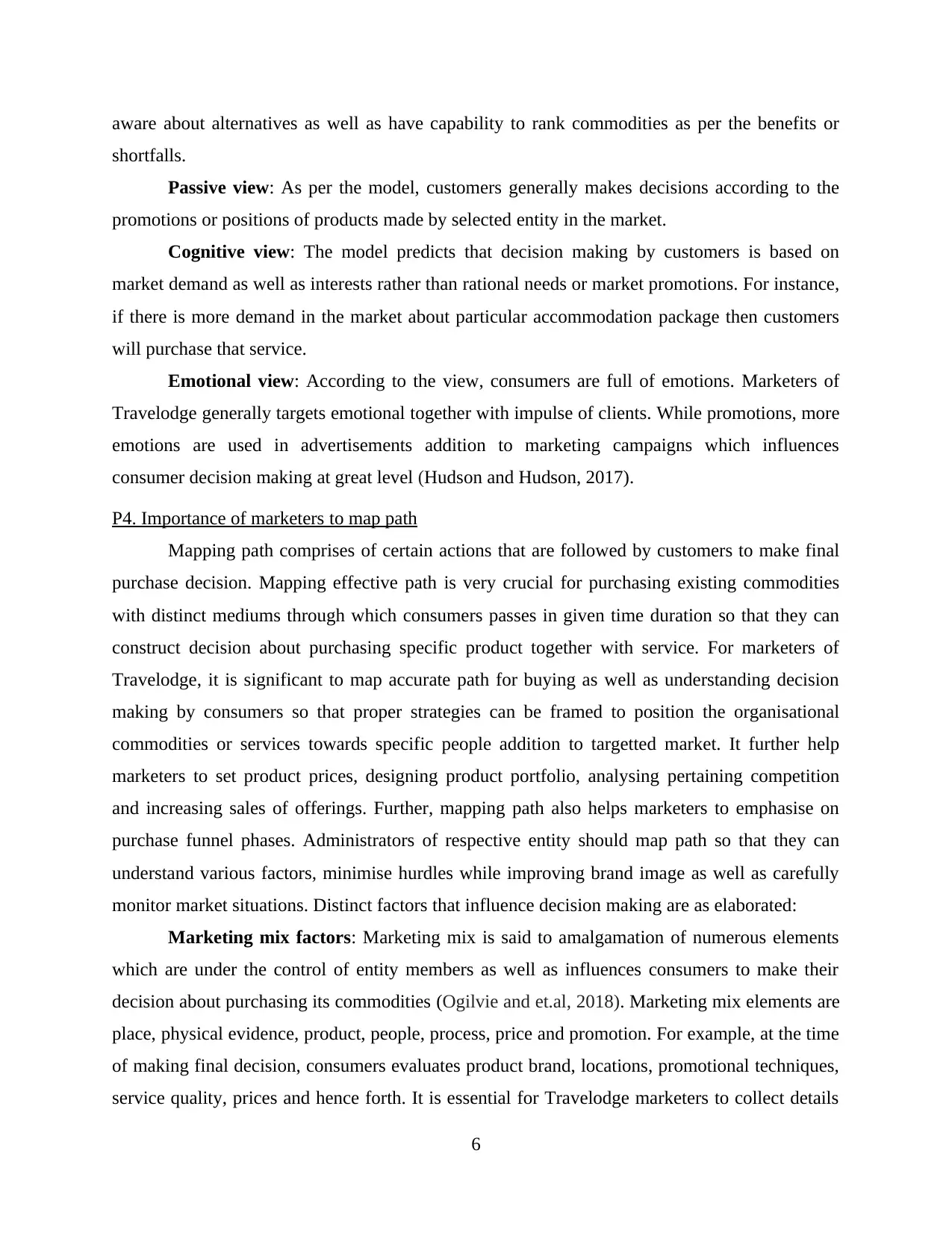
aware about alternatives as well as have capability to rank commodities as per the benefits or
shortfalls.
Passive view: As per the model, customers generally makes decisions according to the
promotions or positions of products made by selected entity in the market.
Cognitive view: The model predicts that decision making by customers is based on
market demand as well as interests rather than rational needs or market promotions. For instance,
if there is more demand in the market about particular accommodation package then customers
will purchase that service.
Emotional view: According to the view, consumers are full of emotions. Marketers of
Travelodge generally targets emotional together with impulse of clients. While promotions, more
emotions are used in advertisements addition to marketing campaigns which influences
consumer decision making at great level (Hudson and Hudson, 2017).
P4. Importance of marketers to map path
Mapping path comprises of certain actions that are followed by customers to make final
purchase decision. Mapping effective path is very crucial for purchasing existing commodities
with distinct mediums through which consumers passes in given time duration so that they can
construct decision about purchasing specific product together with service. For marketers of
Travelodge, it is significant to map accurate path for buying as well as understanding decision
making by consumers so that proper strategies can be framed to position the organisational
commodities or services towards specific people addition to targetted market. It further help
marketers to set product prices, designing product portfolio, analysing pertaining competition
and increasing sales of offerings. Further, mapping path also helps marketers to emphasise on
purchase funnel phases. Administrators of respective entity should map path so that they can
understand various factors, minimise hurdles while improving brand image as well as carefully
monitor market situations. Distinct factors that influence decision making are as elaborated:
Marketing mix factors: Marketing mix is said to amalgamation of numerous elements
which are under the control of entity members as well as influences consumers to make their
decision about purchasing its commodities (Ogilvie and et.al, 2018). Marketing mix elements are
place, physical evidence, product, people, process, price and promotion. For example, at the time
of making final decision, consumers evaluates product brand, locations, promotional techniques,
service quality, prices and hence forth. It is essential for Travelodge marketers to collect details
6
shortfalls.
Passive view: As per the model, customers generally makes decisions according to the
promotions or positions of products made by selected entity in the market.
Cognitive view: The model predicts that decision making by customers is based on
market demand as well as interests rather than rational needs or market promotions. For instance,
if there is more demand in the market about particular accommodation package then customers
will purchase that service.
Emotional view: According to the view, consumers are full of emotions. Marketers of
Travelodge generally targets emotional together with impulse of clients. While promotions, more
emotions are used in advertisements addition to marketing campaigns which influences
consumer decision making at great level (Hudson and Hudson, 2017).
P4. Importance of marketers to map path
Mapping path comprises of certain actions that are followed by customers to make final
purchase decision. Mapping effective path is very crucial for purchasing existing commodities
with distinct mediums through which consumers passes in given time duration so that they can
construct decision about purchasing specific product together with service. For marketers of
Travelodge, it is significant to map accurate path for buying as well as understanding decision
making by consumers so that proper strategies can be framed to position the organisational
commodities or services towards specific people addition to targetted market. It further help
marketers to set product prices, designing product portfolio, analysing pertaining competition
and increasing sales of offerings. Further, mapping path also helps marketers to emphasise on
purchase funnel phases. Administrators of respective entity should map path so that they can
understand various factors, minimise hurdles while improving brand image as well as carefully
monitor market situations. Distinct factors that influence decision making are as elaborated:
Marketing mix factors: Marketing mix is said to amalgamation of numerous elements
which are under the control of entity members as well as influences consumers to make their
decision about purchasing its commodities (Ogilvie and et.al, 2018). Marketing mix elements are
place, physical evidence, product, people, process, price and promotion. For example, at the time
of making final decision, consumers evaluates product brand, locations, promotional techniques,
service quality, prices and hence forth. It is essential for Travelodge marketers to collect details
6
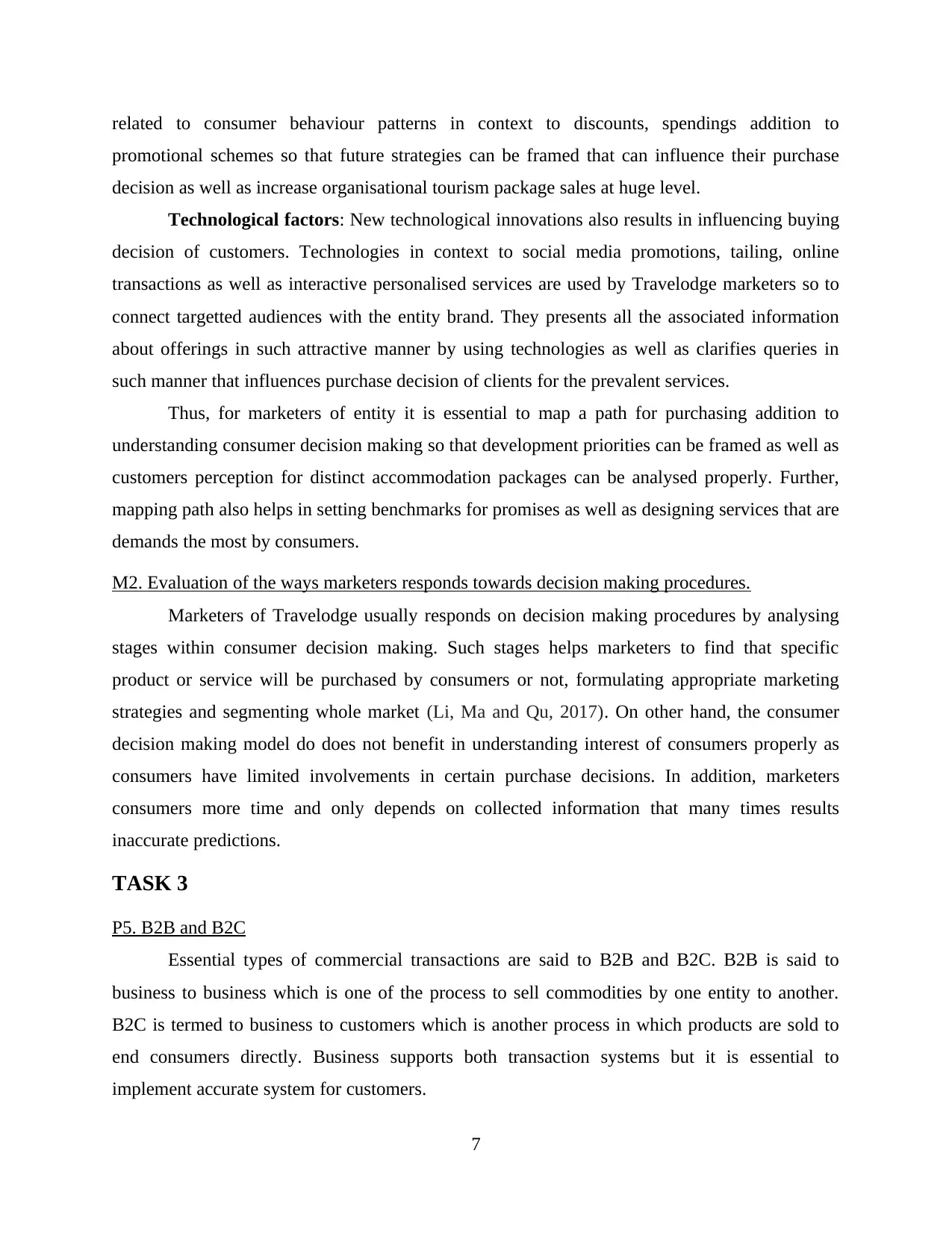
related to consumer behaviour patterns in context to discounts, spendings addition to
promotional schemes so that future strategies can be framed that can influence their purchase
decision as well as increase organisational tourism package sales at huge level.
Technological factors: New technological innovations also results in influencing buying
decision of customers. Technologies in context to social media promotions, tailing, online
transactions as well as interactive personalised services are used by Travelodge marketers so to
connect targetted audiences with the entity brand. They presents all the associated information
about offerings in such attractive manner by using technologies as well as clarifies queries in
such manner that influences purchase decision of clients for the prevalent services.
Thus, for marketers of entity it is essential to map a path for purchasing addition to
understanding consumer decision making so that development priorities can be framed as well as
customers perception for distinct accommodation packages can be analysed properly. Further,
mapping path also helps in setting benchmarks for promises as well as designing services that are
demands the most by consumers.
M2. Evaluation of the ways marketers responds towards decision making procedures.
Marketers of Travelodge usually responds on decision making procedures by analysing
stages within consumer decision making. Such stages helps marketers to find that specific
product or service will be purchased by consumers or not, formulating appropriate marketing
strategies and segmenting whole market (Li, Ma and Qu, 2017). On other hand, the consumer
decision making model do does not benefit in understanding interest of consumers properly as
consumers have limited involvements in certain purchase decisions. In addition, marketers
consumers more time and only depends on collected information that many times results
inaccurate predictions.
TASK 3
P5. B2B and B2C
Essential types of commercial transactions are said to B2B and B2C. B2B is said to
business to business which is one of the process to sell commodities by one entity to another.
B2C is termed to business to customers which is another process in which products are sold to
end consumers directly. Business supports both transaction systems but it is essential to
implement accurate system for customers.
7
promotional schemes so that future strategies can be framed that can influence their purchase
decision as well as increase organisational tourism package sales at huge level.
Technological factors: New technological innovations also results in influencing buying
decision of customers. Technologies in context to social media promotions, tailing, online
transactions as well as interactive personalised services are used by Travelodge marketers so to
connect targetted audiences with the entity brand. They presents all the associated information
about offerings in such attractive manner by using technologies as well as clarifies queries in
such manner that influences purchase decision of clients for the prevalent services.
Thus, for marketers of entity it is essential to map a path for purchasing addition to
understanding consumer decision making so that development priorities can be framed as well as
customers perception for distinct accommodation packages can be analysed properly. Further,
mapping path also helps in setting benchmarks for promises as well as designing services that are
demands the most by consumers.
M2. Evaluation of the ways marketers responds towards decision making procedures.
Marketers of Travelodge usually responds on decision making procedures by analysing
stages within consumer decision making. Such stages helps marketers to find that specific
product or service will be purchased by consumers or not, formulating appropriate marketing
strategies and segmenting whole market (Li, Ma and Qu, 2017). On other hand, the consumer
decision making model do does not benefit in understanding interest of consumers properly as
consumers have limited involvements in certain purchase decisions. In addition, marketers
consumers more time and only depends on collected information that many times results
inaccurate predictions.
TASK 3
P5. B2B and B2C
Essential types of commercial transactions are said to B2B and B2C. B2B is said to
business to business which is one of the process to sell commodities by one entity to another.
B2C is termed to business to customers which is another process in which products are sold to
end consumers directly. Business supports both transaction systems but it is essential to
implement accurate system for customers.
7
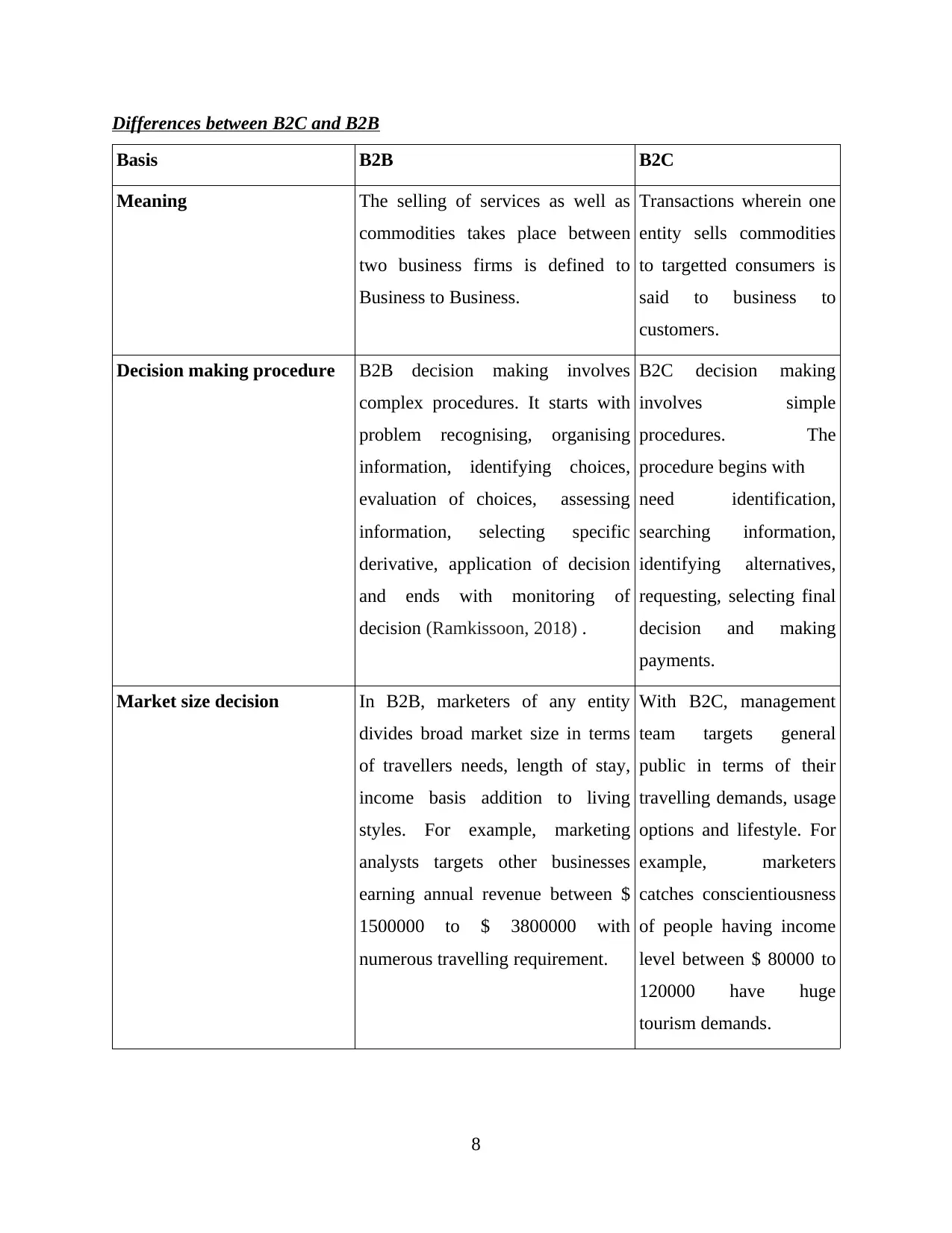
Differences between B2C and B2B
Basis B2B B2C
Meaning The selling of services as well as
commodities takes place between
two business firms is defined to
Business to Business.
Transactions wherein one
entity sells commodities
to targetted consumers is
said to business to
customers.
Decision making procedure B2B decision making involves
complex procedures. It starts with
problem recognising, organising
information, identifying choices,
evaluation of choices, assessing
information, selecting specific
derivative, application of decision
and ends with monitoring of
decision (Ramkissoon, 2018) .
B2C decision making
involves simple
procedures. The
procedure begins with
need identification,
searching information,
identifying alternatives,
requesting, selecting final
decision and making
payments.
Market size decision In B2B, marketers of any entity
divides broad market size in terms
of travellers needs, length of stay,
income basis addition to living
styles. For example, marketing
analysts targets other businesses
earning annual revenue between $
1500000 to $ 3800000 with
numerous travelling requirement.
With B2C, management
team targets general
public in terms of their
travelling demands, usage
options and lifestyle. For
example, marketers
catches conscientiousness
of people having income
level between $ 80000 to
120000 have huge
tourism demands.
8
Basis B2B B2C
Meaning The selling of services as well as
commodities takes place between
two business firms is defined to
Business to Business.
Transactions wherein one
entity sells commodities
to targetted consumers is
said to business to
customers.
Decision making procedure B2B decision making involves
complex procedures. It starts with
problem recognising, organising
information, identifying choices,
evaluation of choices, assessing
information, selecting specific
derivative, application of decision
and ends with monitoring of
decision (Ramkissoon, 2018) .
B2C decision making
involves simple
procedures. The
procedure begins with
need identification,
searching information,
identifying alternatives,
requesting, selecting final
decision and making
payments.
Market size decision In B2B, marketers of any entity
divides broad market size in terms
of travellers needs, length of stay,
income basis addition to living
styles. For example, marketing
analysts targets other businesses
earning annual revenue between $
1500000 to $ 3800000 with
numerous travelling requirement.
With B2C, management
team targets general
public in terms of their
travelling demands, usage
options and lifestyle. For
example, marketers
catches conscientiousness
of people having income
level between $ 80000 to
120000 have huge
tourism demands.
8
Secure Best Marks with AI Grader
Need help grading? Try our AI Grader for instant feedback on your assignments.
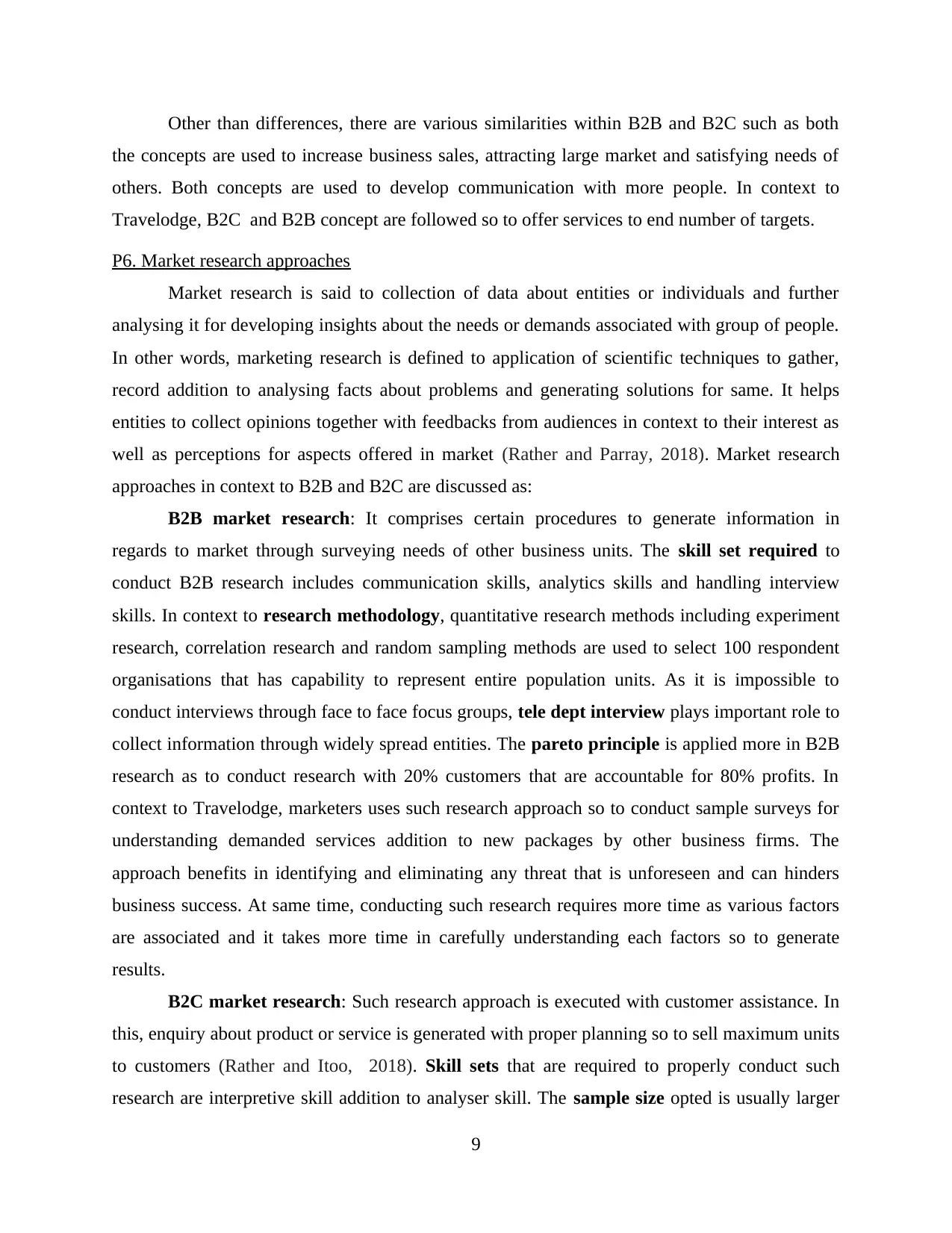
Other than differences, there are various similarities within B2B and B2C such as both
the concepts are used to increase business sales, attracting large market and satisfying needs of
others. Both concepts are used to develop communication with more people. In context to
Travelodge, B2C and B2B concept are followed so to offer services to end number of targets.
P6. Market research approaches
Market research is said to collection of data about entities or individuals and further
analysing it for developing insights about the needs or demands associated with group of people.
In other words, marketing research is defined to application of scientific techniques to gather,
record addition to analysing facts about problems and generating solutions for same. It helps
entities to collect opinions together with feedbacks from audiences in context to their interest as
well as perceptions for aspects offered in market (Rather and Parray, 2018). Market research
approaches in context to B2B and B2C are discussed as:
B2B market research: It comprises certain procedures to generate information in
regards to market through surveying needs of other business units. The skill set required to
conduct B2B research includes communication skills, analytics skills and handling interview
skills. In context to research methodology, quantitative research methods including experiment
research, correlation research and random sampling methods are used to select 100 respondent
organisations that has capability to represent entire population units. As it is impossible to
conduct interviews through face to face focus groups, tele dept interview plays important role to
collect information through widely spread entities. The pareto principle is applied more in B2B
research as to conduct research with 20% customers that are accountable for 80% profits. In
context to Travelodge, marketers uses such research approach so to conduct sample surveys for
understanding demanded services addition to new packages by other business firms. The
approach benefits in identifying and eliminating any threat that is unforeseen and can hinders
business success. At same time, conducting such research requires more time as various factors
are associated and it takes more time in carefully understanding each factors so to generate
results.
B2C market research: Such research approach is executed with customer assistance. In
this, enquiry about product or service is generated with proper planning so to sell maximum units
to customers (Rather and Itoo, 2018). Skill sets that are required to properly conduct such
research are interpretive skill addition to analyser skill. The sample size opted is usually larger
9
the concepts are used to increase business sales, attracting large market and satisfying needs of
others. Both concepts are used to develop communication with more people. In context to
Travelodge, B2C and B2B concept are followed so to offer services to end number of targets.
P6. Market research approaches
Market research is said to collection of data about entities or individuals and further
analysing it for developing insights about the needs or demands associated with group of people.
In other words, marketing research is defined to application of scientific techniques to gather,
record addition to analysing facts about problems and generating solutions for same. It helps
entities to collect opinions together with feedbacks from audiences in context to their interest as
well as perceptions for aspects offered in market (Rather and Parray, 2018). Market research
approaches in context to B2B and B2C are discussed as:
B2B market research: It comprises certain procedures to generate information in
regards to market through surveying needs of other business units. The skill set required to
conduct B2B research includes communication skills, analytics skills and handling interview
skills. In context to research methodology, quantitative research methods including experiment
research, correlation research and random sampling methods are used to select 100 respondent
organisations that has capability to represent entire population units. As it is impossible to
conduct interviews through face to face focus groups, tele dept interview plays important role to
collect information through widely spread entities. The pareto principle is applied more in B2B
research as to conduct research with 20% customers that are accountable for 80% profits. In
context to Travelodge, marketers uses such research approach so to conduct sample surveys for
understanding demanded services addition to new packages by other business firms. The
approach benefits in identifying and eliminating any threat that is unforeseen and can hinders
business success. At same time, conducting such research requires more time as various factors
are associated and it takes more time in carefully understanding each factors so to generate
results.
B2C market research: Such research approach is executed with customer assistance. In
this, enquiry about product or service is generated with proper planning so to sell maximum units
to customers (Rather and Itoo, 2018). Skill sets that are required to properly conduct such
research are interpretive skill addition to analyser skill. The sample size opted is usually larger
9
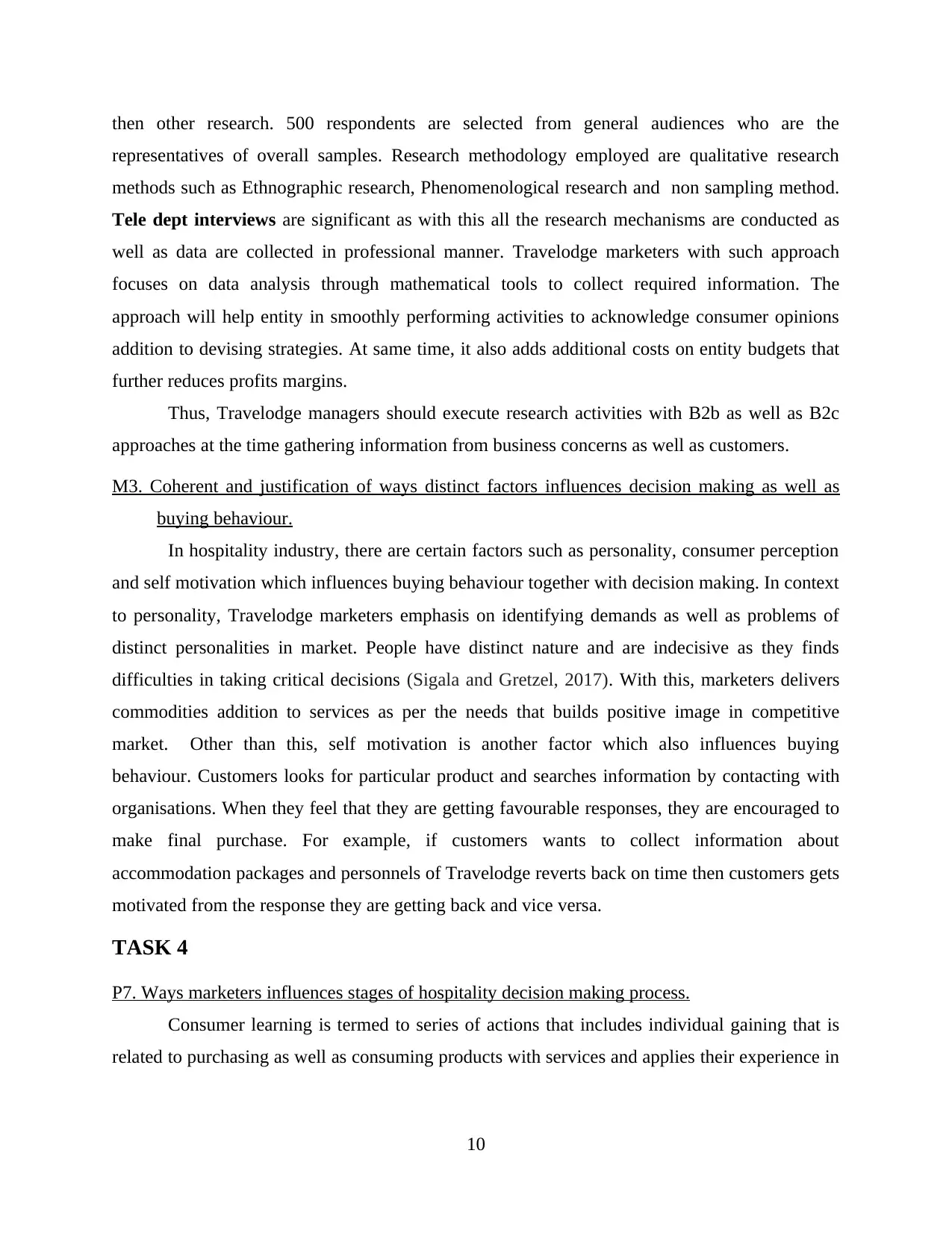
then other research. 500 respondents are selected from general audiences who are the
representatives of overall samples. Research methodology employed are qualitative research
methods such as Ethnographic research, Phenomenological research and non sampling method.
Tele dept interviews are significant as with this all the research mechanisms are conducted as
well as data are collected in professional manner. Travelodge marketers with such approach
focuses on data analysis through mathematical tools to collect required information. The
approach will help entity in smoothly performing activities to acknowledge consumer opinions
addition to devising strategies. At same time, it also adds additional costs on entity budgets that
further reduces profits margins.
Thus, Travelodge managers should execute research activities with B2b as well as B2c
approaches at the time gathering information from business concerns as well as customers.
M3. Coherent and justification of ways distinct factors influences decision making as well as
buying behaviour.
In hospitality industry, there are certain factors such as personality, consumer perception
and self motivation which influences buying behaviour together with decision making. In context
to personality, Travelodge marketers emphasis on identifying demands as well as problems of
distinct personalities in market. People have distinct nature and are indecisive as they finds
difficulties in taking critical decisions (Sigala and Gretzel, 2017). With this, marketers delivers
commodities addition to services as per the needs that builds positive image in competitive
market. Other than this, self motivation is another factor which also influences buying
behaviour. Customers looks for particular product and searches information by contacting with
organisations. When they feel that they are getting favourable responses, they are encouraged to
make final purchase. For example, if customers wants to collect information about
accommodation packages and personnels of Travelodge reverts back on time then customers gets
motivated from the response they are getting back and vice versa.
TASK 4
P7. Ways marketers influences stages of hospitality decision making process.
Consumer learning is termed to series of actions that includes individual gaining that is
related to purchasing as well as consuming products with services and applies their experience in
10
representatives of overall samples. Research methodology employed are qualitative research
methods such as Ethnographic research, Phenomenological research and non sampling method.
Tele dept interviews are significant as with this all the research mechanisms are conducted as
well as data are collected in professional manner. Travelodge marketers with such approach
focuses on data analysis through mathematical tools to collect required information. The
approach will help entity in smoothly performing activities to acknowledge consumer opinions
addition to devising strategies. At same time, it also adds additional costs on entity budgets that
further reduces profits margins.
Thus, Travelodge managers should execute research activities with B2b as well as B2c
approaches at the time gathering information from business concerns as well as customers.
M3. Coherent and justification of ways distinct factors influences decision making as well as
buying behaviour.
In hospitality industry, there are certain factors such as personality, consumer perception
and self motivation which influences buying behaviour together with decision making. In context
to personality, Travelodge marketers emphasis on identifying demands as well as problems of
distinct personalities in market. People have distinct nature and are indecisive as they finds
difficulties in taking critical decisions (Sigala and Gretzel, 2017). With this, marketers delivers
commodities addition to services as per the needs that builds positive image in competitive
market. Other than this, self motivation is another factor which also influences buying
behaviour. Customers looks for particular product and searches information by contacting with
organisations. When they feel that they are getting favourable responses, they are encouraged to
make final purchase. For example, if customers wants to collect information about
accommodation packages and personnels of Travelodge reverts back on time then customers gets
motivated from the response they are getting back and vice versa.
TASK 4
P7. Ways marketers influences stages of hospitality decision making process.
Consumer learning is termed to series of actions that includes individual gaining that is
related to purchasing as well as consuming products with services and applies their experience in
10
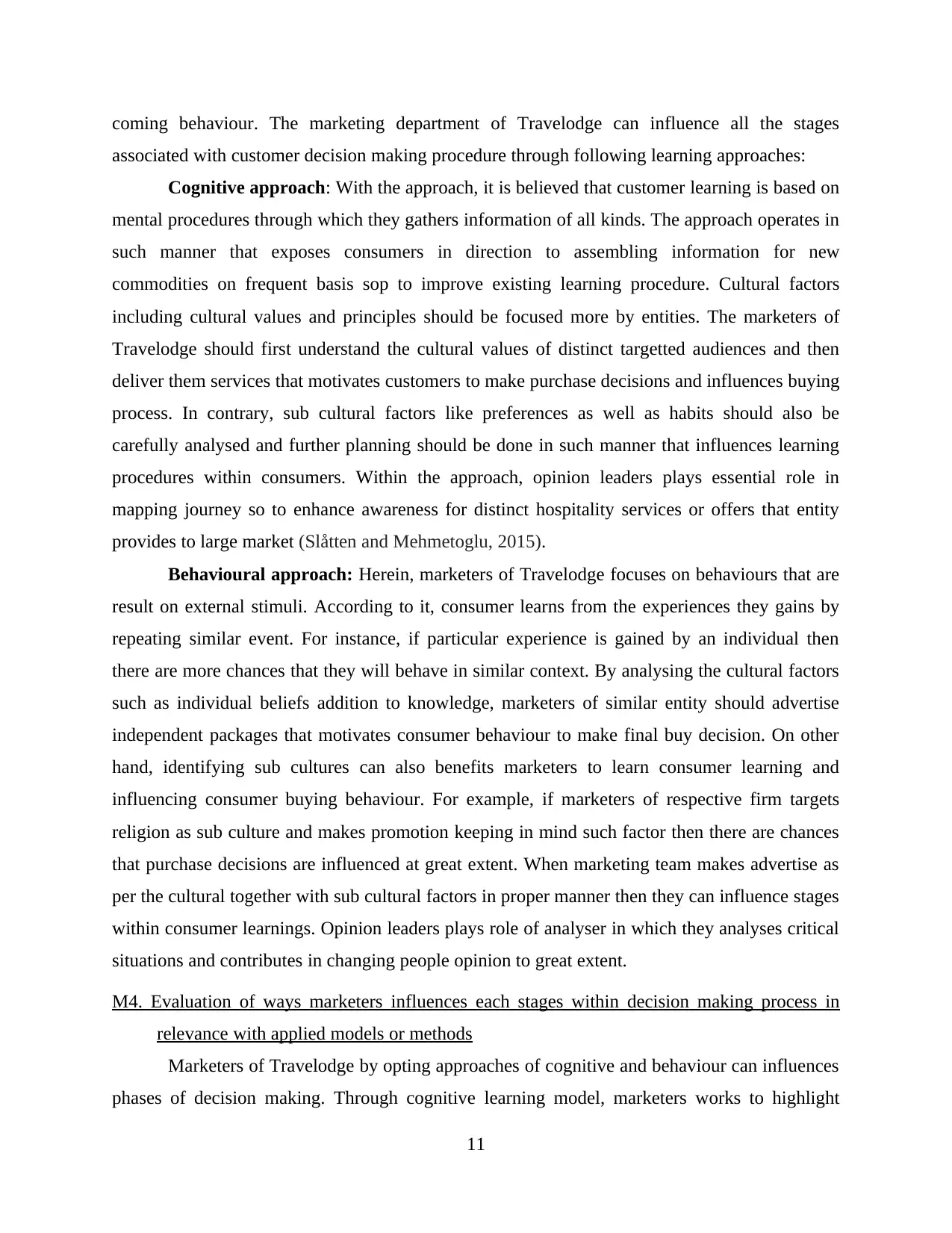
coming behaviour. The marketing department of Travelodge can influence all the stages
associated with customer decision making procedure through following learning approaches:
Cognitive approach: With the approach, it is believed that customer learning is based on
mental procedures through which they gathers information of all kinds. The approach operates in
such manner that exposes consumers in direction to assembling information for new
commodities on frequent basis sop to improve existing learning procedure. Cultural factors
including cultural values and principles should be focused more by entities. The marketers of
Travelodge should first understand the cultural values of distinct targetted audiences and then
deliver them services that motivates customers to make purchase decisions and influences buying
process. In contrary, sub cultural factors like preferences as well as habits should also be
carefully analysed and further planning should be done in such manner that influences learning
procedures within consumers. Within the approach, opinion leaders plays essential role in
mapping journey so to enhance awareness for distinct hospitality services or offers that entity
provides to large market (Slåtten and Mehmetoglu, 2015).
Behavioural approach: Herein, marketers of Travelodge focuses on behaviours that are
result on external stimuli. According to it, consumer learns from the experiences they gains by
repeating similar event. For instance, if particular experience is gained by an individual then
there are more chances that they will behave in similar context. By analysing the cultural factors
such as individual beliefs addition to knowledge, marketers of similar entity should advertise
independent packages that motivates consumer behaviour to make final buy decision. On other
hand, identifying sub cultures can also benefits marketers to learn consumer learning and
influencing consumer buying behaviour. For example, if marketers of respective firm targets
religion as sub culture and makes promotion keeping in mind such factor then there are chances
that purchase decisions are influenced at great extent. When marketing team makes advertise as
per the cultural together with sub cultural factors in proper manner then they can influence stages
within consumer learnings. Opinion leaders plays role of analyser in which they analyses critical
situations and contributes in changing people opinion to great extent.
M4. Evaluation of ways marketers influences each stages within decision making process in
relevance with applied models or methods
Marketers of Travelodge by opting approaches of cognitive and behaviour can influences
phases of decision making. Through cognitive learning model, marketers works to highlight
11
associated with customer decision making procedure through following learning approaches:
Cognitive approach: With the approach, it is believed that customer learning is based on
mental procedures through which they gathers information of all kinds. The approach operates in
such manner that exposes consumers in direction to assembling information for new
commodities on frequent basis sop to improve existing learning procedure. Cultural factors
including cultural values and principles should be focused more by entities. The marketers of
Travelodge should first understand the cultural values of distinct targetted audiences and then
deliver them services that motivates customers to make purchase decisions and influences buying
process. In contrary, sub cultural factors like preferences as well as habits should also be
carefully analysed and further planning should be done in such manner that influences learning
procedures within consumers. Within the approach, opinion leaders plays essential role in
mapping journey so to enhance awareness for distinct hospitality services or offers that entity
provides to large market (Slåtten and Mehmetoglu, 2015).
Behavioural approach: Herein, marketers of Travelodge focuses on behaviours that are
result on external stimuli. According to it, consumer learns from the experiences they gains by
repeating similar event. For instance, if particular experience is gained by an individual then
there are more chances that they will behave in similar context. By analysing the cultural factors
such as individual beliefs addition to knowledge, marketers of similar entity should advertise
independent packages that motivates consumer behaviour to make final buy decision. On other
hand, identifying sub cultures can also benefits marketers to learn consumer learning and
influencing consumer buying behaviour. For example, if marketers of respective firm targets
religion as sub culture and makes promotion keeping in mind such factor then there are chances
that purchase decisions are influenced at great extent. When marketing team makes advertise as
per the cultural together with sub cultural factors in proper manner then they can influence stages
within consumer learnings. Opinion leaders plays role of analyser in which they analyses critical
situations and contributes in changing people opinion to great extent.
M4. Evaluation of ways marketers influences each stages within decision making process in
relevance with applied models or methods
Marketers of Travelodge by opting approaches of cognitive and behaviour can influences
phases of decision making. Through cognitive learning model, marketers works to highlight
11
Paraphrase This Document
Need a fresh take? Get an instant paraphrase of this document with our AI Paraphraser
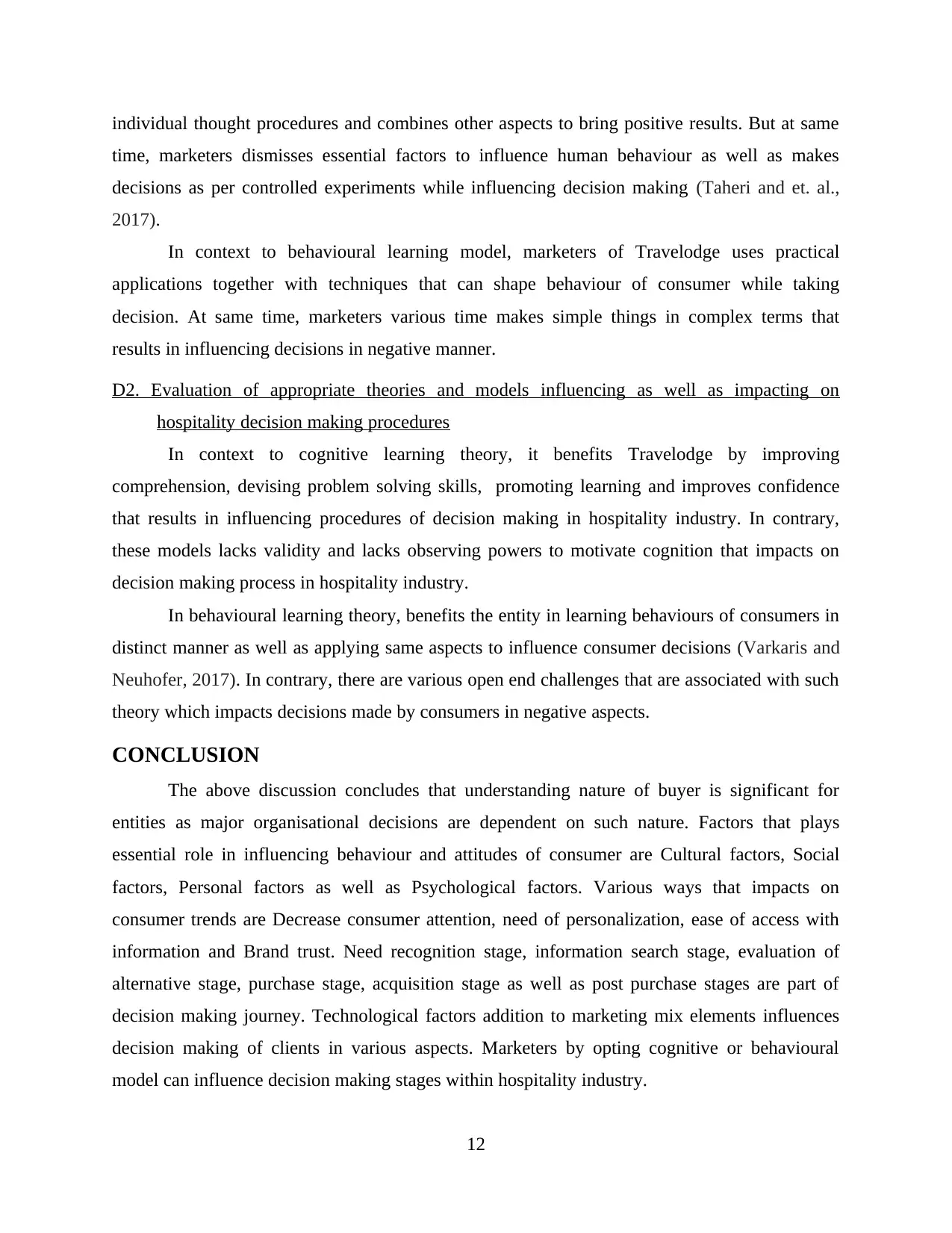
individual thought procedures and combines other aspects to bring positive results. But at same
time, marketers dismisses essential factors to influence human behaviour as well as makes
decisions as per controlled experiments while influencing decision making (Taheri and et. al.,
2017).
In context to behavioural learning model, marketers of Travelodge uses practical
applications together with techniques that can shape behaviour of consumer while taking
decision. At same time, marketers various time makes simple things in complex terms that
results in influencing decisions in negative manner.
D2. Evaluation of appropriate theories and models influencing as well as impacting on
hospitality decision making procedures
In context to cognitive learning theory, it benefits Travelodge by improving
comprehension, devising problem solving skills, promoting learning and improves confidence
that results in influencing procedures of decision making in hospitality industry. In contrary,
these models lacks validity and lacks observing powers to motivate cognition that impacts on
decision making process in hospitality industry.
In behavioural learning theory, benefits the entity in learning behaviours of consumers in
distinct manner as well as applying same aspects to influence consumer decisions (Varkaris and
Neuhofer, 2017). In contrary, there are various open end challenges that are associated with such
theory which impacts decisions made by consumers in negative aspects.
CONCLUSION
The above discussion concludes that understanding nature of buyer is significant for
entities as major organisational decisions are dependent on such nature. Factors that plays
essential role in influencing behaviour and attitudes of consumer are Cultural factors, Social
factors, Personal factors as well as Psychological factors. Various ways that impacts on
consumer trends are Decrease consumer attention, need of personalization, ease of access with
information and Brand trust. Need recognition stage, information search stage, evaluation of
alternative stage, purchase stage, acquisition stage as well as post purchase stages are part of
decision making journey. Technological factors addition to marketing mix elements influences
decision making of clients in various aspects. Marketers by opting cognitive or behavioural
model can influence decision making stages within hospitality industry.
12
time, marketers dismisses essential factors to influence human behaviour as well as makes
decisions as per controlled experiments while influencing decision making (Taheri and et. al.,
2017).
In context to behavioural learning model, marketers of Travelodge uses practical
applications together with techniques that can shape behaviour of consumer while taking
decision. At same time, marketers various time makes simple things in complex terms that
results in influencing decisions in negative manner.
D2. Evaluation of appropriate theories and models influencing as well as impacting on
hospitality decision making procedures
In context to cognitive learning theory, it benefits Travelodge by improving
comprehension, devising problem solving skills, promoting learning and improves confidence
that results in influencing procedures of decision making in hospitality industry. In contrary,
these models lacks validity and lacks observing powers to motivate cognition that impacts on
decision making process in hospitality industry.
In behavioural learning theory, benefits the entity in learning behaviours of consumers in
distinct manner as well as applying same aspects to influence consumer decisions (Varkaris and
Neuhofer, 2017). In contrary, there are various open end challenges that are associated with such
theory which impacts decisions made by consumers in negative aspects.
CONCLUSION
The above discussion concludes that understanding nature of buyer is significant for
entities as major organisational decisions are dependent on such nature. Factors that plays
essential role in influencing behaviour and attitudes of consumer are Cultural factors, Social
factors, Personal factors as well as Psychological factors. Various ways that impacts on
consumer trends are Decrease consumer attention, need of personalization, ease of access with
information and Brand trust. Need recognition stage, information search stage, evaluation of
alternative stage, purchase stage, acquisition stage as well as post purchase stages are part of
decision making journey. Technological factors addition to marketing mix elements influences
decision making of clients in various aspects. Marketers by opting cognitive or behavioural
model can influence decision making stages within hospitality industry.
12

13
1 out of 15
Related Documents
Your All-in-One AI-Powered Toolkit for Academic Success.
+13062052269
info@desklib.com
Available 24*7 on WhatsApp / Email
![[object Object]](/_next/static/media/star-bottom.7253800d.svg)
Unlock your academic potential
© 2024 | Zucol Services PVT LTD | All rights reserved.


